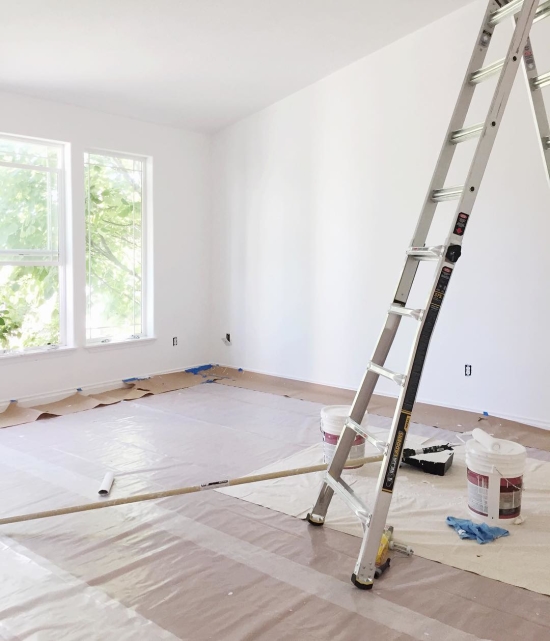15
This is a collaborative post. All opinions are my own.
If you read this blog, I'm guessing you love interior design and decorating your home. Perhaps like me, you've also entertained the thought of flipping houses. When done right, house flipping is an awesome way to use your decor skills in a financially smart way, that adds income to your bank account, instead of subtracting from it. It may seem like the best of both worlds: a way to indulge your love for design, while also earning some side money and improving your financial position. And it definitely can be! However, where there's opportunity to gain a lot of money, there's also the risk of losing a lot. House flipping isn’t always easy, and you could find that you are faced with a variety of issues you didn't anticipate, which need to be swiftly dealt with. So it's super important to do your research, make sure you're in a stable financial situation, and learn from other successful house flippers! From what I've seen, it makes a lot of sense for beginners who don't have a ton of extra cash to start with the house you live in. Buy a house that's below market value with plenty of room for improvement, and fix it up while you're living there--that way, you're not paying an extra mortgage while you work on the renovations. Do it well, and you could make quite a nice profit from selling the improved property! In my research, I've also found some other useful "golden rules" that beginners should stick to when flipping their first property.
Start Off With A Small Project
One of the first things to understand is that your first flipping project should be small and relatively easy. You don’t want to throw yourself in the deep end, that’s for sure! It’s much better to start off with a easy project that you should have no problem managing, and then building up your skills and experience from there. If this first one is a success, then you can always take on a slightly trickier project next time if you decide that you want to continue with more house flipping.
Make Sure You Have Great Credit
You will also need to make sure that you have a good credit rating before you move forward with flipping a house. This will help you purchase the property in the first place, as good credit will open you up to a lot more mortgage options. Once you have a good credit report, more lenders will trust you with a loan. Because of this, they will be a lot more likely to offer you their best deals, which means you won’t need to worry about high-interest rates being added onto your loan repayments. But good credit won’t just help you when it comes to purchasing the property. It will also help you get any loans that you require for maintenance and work carried out on the property. Read these credit score tips if you have a bad credit score at the moment.
You Need Cash As Well
It’s not a good idea to rely on loans and other forms of credit for you to flip a house, though. If you are too reliant on these forms of financing, you might find that it can be all too easy to spiral into debt that you can’t afford to pay back, even after you have sold the house that you flip. So, it’s a good idea to save up and have a stash of cash in the bank that you can dip into for any small jobs or work that need carrying out on the home. You will find that this helps you stay in the black throughout the whole of the flipping project, which will ensure that your finances stay healthy.
Location, Location, Location
If you haven’t yet decided on the area in which you will buy your project property, it’s best to narrow down your options so that you are only looking at good locations. These should be neighborhoods that buyers are eager to move to because they are safe and have good schools and amenities. If you flip a property in this kind of area, then you should find it sells very quickly and for a good price too. It could also be worth looking to buy a house to flip in an up-and-coming area too. This is an area that is currently undergoing a lot of improvement and is favored by young families and students. There will be a lot of gentrification in the area, which is always a good sign as it shows that property prices are slowly on the rise.
Buy Cheap
One thing to remember is that you generally make your money when you buy the house. That means you should know on the day you close that you got a good bargain. Of course, the work you do on the house will also increase its value, but starting with a house that's below market value gives you a great head start and a safety net. Plus, if you do buy cheaply, then you will have a lot more money left over in your budget to carry out various jobs and maintenance. So, when you are house hunting for a property to flip, be sure to keep an eye out for homes that have been priced to sell.
Always Get A Home Inspection Before You Buy
Just because you’ve found a house that appears to be a good value, doesn't mean you shouldn’t jump on it just yet. It's super important to get an inspection done by a professional home inspector and get estimates for the issues they find (there will always be something they find). A home inspector will carefully examine the property and determine if there are any structural issues or other problems that should give you cause for concern. For example, they might find that there is some urgent work that need to be completed, that may end up being very expensive. If this is the case, you might want to disregard the property and look elsewhere for a house that isn't as pricey to improve. Or if you're not scared off by this, you can use it to negotiate a much lower price that will leave you the money needed to carry out those repairs right away.
Invest In Key Rooms
When you buy a house to flip, time is of the essence. So once your offer is accepted, before you even get the keys, you should strategize which improvements to focus on. You will probably have a lot of decorating and maintenance to carry out, and it may be overwhelming. Trying to figure out where to start is can be quite difficult for beginners. However, one general rule of thumb is that you'll get the most value out of investing time, energy, and money into the bathrooms and kitchen. You should make sure that these well done and feature contemporary fittings. It’s worth taking a look at Drench and other sites that sell kitchen fittings to make sure you choose good-quality fixtures that look up to date. Most buyers want to see new or recently installed bathrooms and kitchens, so they don't have to deal with those expensive and messy remodels once they move in. Focusing on these rooms can help you increase the value of the property dramatically, and ensure that it sells as quickly as possible.
Be Prepared To Do Some Networking
Most people who carry out regular flipping projects find that networking with other property investors can be very beneficial for them. It gives them the chance to meet with other people who are doing what they are doing, and allows them to share tips and tricks. You should also network with prospective buyers and find out exactly what they are looking for in a new property. You never know; you might buy the perfect buyer for your next flipped property! Networking can also be a great way to find the perfect house to buy--before it even hits the MLS. Off-market deals are a great way to get a good price and eliminate the competition!
Use Reliable Contractors
When you are flipping a property, you will no doubt need to hire some contractors to take care of some of the more complicated home maintenance jobs. The older the property is, the more contractors you will need to work with to bring it up to standard. A shady contractor can end up costing you a lot of money and time (and when flipping, time is money). It's essential that you do plenty of research, get recommendations, and call references, to ensure that you hire reliable and trustworthy contractors. You'll also want check out their portfolio--or better yet, check out one of their completed jobs in person--to make sure that you are happy with the standard of work that they carry out. It’s also important to get multiple quotes so you know you're getting a good price. You don't necessarily want to hire the cheapest person (that can be a red flag), but you certainly don't want to overpay either.
Ensure You Have Plenty Of Time
One of the main things to remember when it comes to flipping homes is that it takes time. Renovations nearly always take longer than you initially thought, because surprises come up, weather may not cooperate, and contractors have other jobs they're juggling. You don't want to end up rushing at the end to hit an aggressive or overly optimistic timeline--that will certainly show in the results. If you're doing the work yourself while also working your full-time job, then you'll definitely want to give yourself a long timeframe so you don’t get too stressed out. Expect that issues will crop up that could push your timeline back, and make sure you have built in a cushion of time (and money) to deal with those issues.
Flipping a house seems like a really exciting and fun project, especially for those of us that love interior design and home decor. But it can also be quite frustrating if things start to go wrong. Have you flipped a house before? What are your "golden rules?"



